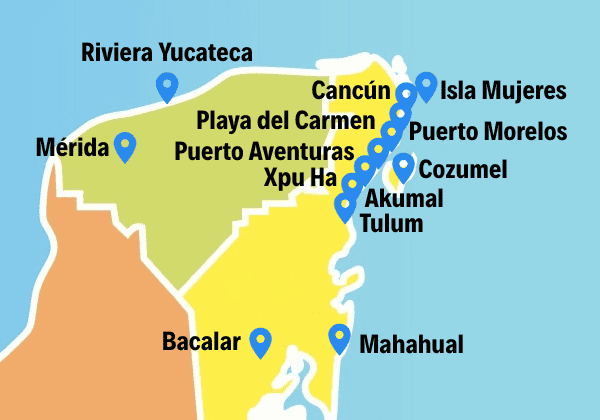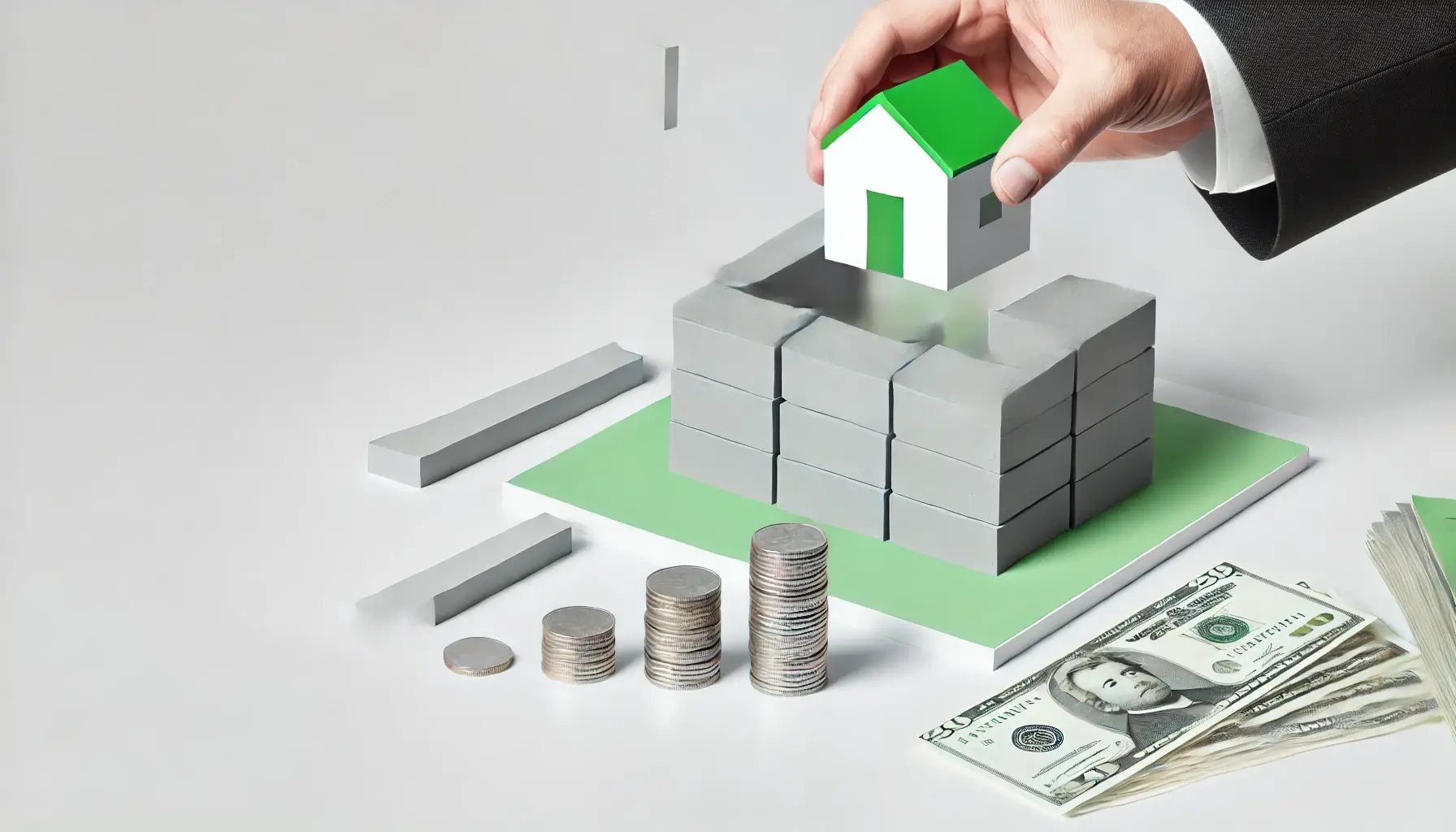The world of real estate development can seem overwhelming, especially if you’re just starting out. Whether you’ve inherited a piece of land or are inspired by the idea of building from scratch, having a clear guide is essential to avoid costly mistakes. In this article, we’ll explain, in simple terms, the key steps you should follow, from choosing the right lot to organizing your team and developing your sales strategy. Patience and focus on each step will be your best allies for achieving a successful project. Let’s walk this path together!
Table of Contents
What is Real Estate Development?
Real estate development is the process of creating, renovating, or improving properties for residential, commercial, industrial, or mixed use. This process includes several key stages, such as land acquisition, planning, design, construction, and marketing. It is a fundamental activity within the economic sector, as it drives investment, generates employment, and promotes urban growth.
Definition and Key Features
Real estate development is defined as the set of activities that transform an unused piece of land or building into a profitable asset. Its main characteristics include:
- Strategic Planning: Involves market studies, feasibility analysis, and selection of strategic locations.
- Financial Management: Requires adequate financing and cost control to ensure project profitability.
- Legal Compliance: Includes obtaining permits, licenses, and complying with local regulations.
- Innovation and Sustainability: More and more projects are integrating green practices and modern technologies to meet market demand.
Importance in the Economic Sector
Real estate development plays a crucial role in the economy, as it:
- Boosts Investment: It is an attractive sector for national and international investors.
- Generates Employment: From architects to construction workers, it employs thousands of people directly and indirectly.
- Promotes Urban Development: Improves infrastructure and creates habitable and sustainable spaces.
- Increases Capital Gains: Contributes to increasing the value of properties in strategic areas.
Real estate development not only meets the growing demand for housing and commercial space, but also acts as an economic engine that transforms entire cities and regions.
Key Steps to Becoming a Successful Real Estate Developer
Define your approach as a developer
Before diving headfirst into the world of real estate development, it’s crucial to define what type of developer you want to be. The real estate sector encompasses different areas, each with its own unique characteristics, challenges, and benefits. To get off to a good start, you need to specialize in one type of development, rather than covering several fields at once.
There are three major areas of specialization within real estate development:
- Housing Development : This focuses on the construction of residential properties such as houses, apartments, or housing complexes. It’s one of the broadest and most accessible sectors, ideal for those looking to get started in real estate development.
- Commercial Development : This includes the creation of commercial spaces such as shopping centers, offices, retail stores, and warehouses. This type of development tends to require more initial capital, but commercial rents can be a stable source of income.
- Hotel Development : This type of developer focuses on building hotels, hostels, and other hospitality-related spaces. While it’s a more specialized market, it can be very profitable if you choose a good location and an attractive concept.
Choose your specialization from the beginning
It’s tempting to try to tackle several areas of real estate development at the same time, but the most successful projects always begin with a clear and defined focus . As the guide points out: “Don’t spread yourself thin; choose just one area to start.” Great developers like Warren Buffett and Bill Gates stood out precisely for remaining focused and disciplined from their first projects.
Each type of development has specific characteristics that you should master before starting. For example, if you choose the housing sector, you’ll need to understand building regulations and the behavior of the residential market. If you prefer the commercial or hotel sector, you’ll need to study consumer trends in urban and tourist areas, as well as the dynamics of tourism and shared spaces.
Why is a defined focus important?
Specializing allows you to gain in-depth knowledge of your field and conduct more precise market research. It also makes it easier to form partnerships with the right professionals , from architects to marketing experts, all focused on your specific type of development.
Remember: Starting small and focused is the key to smart, sustainable growth in this sector.

Real Estate Development is a Long-Term Game
If you’re thinking about entering the real estate business with the expectation of generating quick returns , it’s time to reconsider. Real estate development isn’t a sprint, but a marathon that requires patience, planning, and strategy . Those who achieve success in this sector are those who understand that great results take time to arrive and that a project’s true value isn’t built overnight.
The key is to identify the type of business you’re involved in and understand the timeframes within which you can expect to recover your investment and make a profit. Depending on the stage of the real estate business you’re in, the time to generate profit can vary significantly. Here are some examples of average times you should consider for different types of real estate transactions.
How long does a real estate project last?
| Business Stage | Duration |
|---|---|
| Purchase of land in Breña | 5 to 15 years |
| Purchase of land with services for development | 3 to 5 years |
| Purchase of property in pre-sale | 3 to 5 years |
| Purchase of finished property ready to rent | 1 to 3 months |
| Property Purchase for Fix & Flip | 3 to 6 months |
Each real estate development strategy requires its own maturity period . For example, if you buy land in a scrubland (without infrastructure), you could have to wait up to 15 years before the investment bears fruit. On the other hand, deals like Fix & Flip , where you buy a property, improve it, and sell it quickly, can yield profits in a much shorter period of 3 to 6 months .
Analyze your risks
You can’t launch a real estate project without first properly identifying and managing risks . While this sector offers significant opportunities for growth and profitability, it’s also fraught with challenges that, if not managed carefully, can result in significant losses. The most common mistakes in real estate development often arise from overconfidence or a lack of preparedness in risk management. As a developer, your responsibility is to anticipate and mitigate these risks from the outset of the project.
Risk areas to consider
There are four key areas to focus on when assessing the risks of your real estate project. Each has a direct impact on the success or failure of your development, so it’s crucial to thoroughly analyze them before beginning.
- Legal Risk : It’s essential to ensure that everything related to deeds , permits, and regulations is in order. A small legal error can completely halt the project or, worse, cause you to lose your investment.
- Financial Risk : This involves budgets, cash flows , and project financing. A mistake in financial estimates can prevent you from completing construction or, at best, significantly reduce your profit margins.
- Technical Risk : This refers to the supervision of the construction, the quality of materials , and the overall execution of the project. Failure in this area can result in delays, cost overruns, and long-term structural problems.
- Commercial Risk : Here we discuss the marketing plan , sales strategy, and market demand. If you don’t have a solid commercial strategy tailored to your target audience, you may have trouble selling or renting the developed units, which will affect your return on investment.
Risk Areas and Key Activities
| Area | Key Activities |
|---|---|
| Legal | Land deeds Municipal procedures Environmental authorizations Purchase and sale contracts |
| Financial | Financial runs Economic feasibility Cash flows Budget for the execution of works |
| Technique | Executive project Supervision and control of works Construction procedures Quality controls |
| Commercial | Marketing strategy Project branding Formation of the sales team Price list |

How to Choose the Perfect Area for Your Real Estate Project
Choosing the area where you’ll develop your real estate project is one of the most important decisions you’ll make. It’s not enough to find a nice or well-priced lot; you must also ensure that the location is truly suitable for the type of development you have in mind. This will not only affect project demand , but also permitting ease , construction costs , and, ultimately, your profitability .
Where to develop your project?
To choose the best area, you must do a lot of homework. Here are some key considerations :
- Connectivity : Evaluate access to main roads, public transportation, and services such as hospitals, schools, and shopping centers. The more accessible the area, the greater the demand.
- Local regulations : You should review the building regulations and urban development plans for the area. This will help you determine what type of project you can undertake on that land and whether it meets the requirements for obtaining the necessary permits.
- Target market : Who are the people who will live, work, or use the property you develop? If you choose an area that doesn’t fit their profile, it will be difficult to sell or rent the units. For example, if you decide to build luxury homes in a middle-class area, you may have trouble selling them.
Factors to take into account
Here are some of the key factors you should consider when choosing the perfect area for your real estate project:
- Proximity to basic services (hospitals, shops, schools).
- Accessibility and transportation (proximity to main roads or public transportation stations).
- Availability of infrastructure (water, electricity, sanitation).
- Market demand in the area (is there a real need for your type of development?).
- Urban growth trends (is this an area expected to grow in the coming years?).
Tip : If this is your first real estate project, it’s advisable to develop in the same city where you live or one you know well. This way, you’ll have better control over the operation and reduce relocation costs.
Financial Planning and Budgeting
When planning a real estate development project, it’s crucial to calculate realistic numbers from the start. People often make the mistake of overestimating sales prices or underestimating construction costs, which can lead to a financial mismatch that jeopardizes the entire project. To avoid this, it’s important to work with a well-calculated cost structure and be honest about profit margins and contingencies.

In a typical project, costs are divided between the land price, notary fees, licenses, construction, and other essential elements. Although every project is different, having a clear baseline will help you avoid unrealistic expectations . Also, keep in mind that these calculations do not include taxes or other potential additional costs that may arise along the way.
| Concept | % of Total Sales |
|---|---|
| Land | 11% |
| Notary Fees | 2% |
| Market Study | 0.1% |
| Architectural Project | 1.5% |
| Executive Project | 2% |
| Licenses and Procedures | 5% |
| Developers Fee | 6% |
| Marketing | 2% |
| Sales Commissions | 7% |
| Construction | 40% |
| Financial Cost | 7.4% |
| Unforeseen events | 3% |
| Utility | 13% |
Remember: Every miscalculation can cost you a lot of money , so it’s essential to surround yourself with an expert team to help you keep your projections aligned with reality.
Market Strategy Design
“He who sells to everyone, sells to no one.” Before laying a brick on the ground, you must be clear about who you’re selling or renting to . The real estate market is very broad, and not all developments are suitable for all types of clients.
How to identify your target audience.
It’s essential that you know your target audience . You should conduct market research to help you understand what type of people are interested in the area where you plan to build. Here are some examples of customer profiles for real estate projects:
- Young families : Looking for affordable, well-connected housing close to amenities such as daycare centers and schools.
- Investors : Their goal is to acquire properties that can appreciate in value or generate passive income through rents.
- Older adults : They prefer comfortable, safe, accessible housing with nearby services.
Why do a market study?
A good market study will tell you if there’s real demand for your development, what prices buyers are willing to pay, and what the most sought-after features are in the area. It’s much better to fine-tune your project from the start than to discover you can’t sell or rent it once it’s finished.
Choose the ideal terrain
Once you know what type of developer you want to be, have identified the risks, and have analyzed the market, it’s time to choose the perfect plot of land . This is crucial because the land you build on can make or break your project.
How do you know if the land is suitable?
Here are some key questions to ask before purchasing land:
- Do you have writing?It’s essential to verify the legality of the land. If it doesn’t have deeds, you could run into legal problems later.
- What is the permitted land use?Not all land can be used for every type of development. Make sure the land use matches what you have in mind.
- What infrastructure do you already have?Does the land already have utilities such as water, electricity, and sewage? If not, you’ll need to consider the additional costs of bringing these services to your land.
- Is it well located?: In addition to accessibility, you should consider the strategic location of the land. A more expensive plot of land in a prime location could be much more profitable in the long run than a cheaper plot of land in a less desirable area.
Remember : The price of land depends on what you can build on it. Land that seems cheap can be expensive if land use restrictions limit its development.
How to Organize Your Team for Successful Real Estate Development
Real estate development is a complex challenge, and it’s not something you can do alone . You need a team of experts in each key area to ensure everything goes according to plan. Sometimes, in family businesses, positions are filled with inexperienced relatives or friends, which can lead to serious management problems . To avoid complications, it’s essential to surround yourself with skilled professionals from the start.
The key players on your team
Here’s a breakdown of the most important roles you’ll need to ensure your project runs smoothly. Make sure each of these positions is filled by someone with experience and knowledge .
- General Manager : For now, this is you. You’re the one who makes strategic decisions and oversees that the project progresses according to plan in your Real Estate Development.
- Project Manager (subcontracted): This person is responsible for coordinating all areas of the project, from planning to execution. If you can’t hire a full-time Project Manager, you can choose to outsource to a consulting firm to advise you at every stage.
- Administrator : You need an administrator with experience in real estate projects. It’s not worth hiring an inexperienced family member here; this position is key to managing the project’s budget and finances .
- Project Manager : This position should be held by someone with experience in large projects. This is not a position for someone just learning the ropes . The Project Manager will work closely with the Project Manager to ensure everything is completed on time and on schedule.
- Construction Manager : You need someone to oversee the construction and maintain the quality of the materials. This isn’t a job for someone without experience ; it’s a crucial role to ensure construction progresses smoothly and on schedule.
- Sales Director : This position will be responsible for managing all sales and marketing matters. This position is vital for attracting clients and generating interest in your project, so make sure it’s filled by someone with experience in sales strategies .
- Internal Accountant : Someone with solid financial knowledge who can manage expenses and ensure the project stays within budget . This isn’t a role for everyone; you need someone who knows what they’re doing.
- Construction supervisors : These people are the ones who will ensure that the construction follows the established guidelines and that quality is maintained at every stage.
- Legal Services and Consulting : These are essential for processing all permits and licenses, and for ensuring that everything related to contracts and regulations is in order.
- Marketing and Sales : This team will report to the Sales Director and will be responsible for attracting buyers and closing sales . You can outsource sales management to a Master Broker , but make sure your team is aligned with the marketing strategy.
Tip : Don’t underestimate the importance of each of these roles. A mistake in hiring an inexperienced project manager or architect can cost you much more than their fees.

Create a sales strategy
Having a great real estate development isn’t enough if you don’t have a solid sales strategy to bring it to market. Your strategy will be key to ensuring you not only build but also sell units effectively, maximizing your profits. This is especially important in real estate projects, where you’ll often need to sell before the development is completed (pre-sales).
How to plan your market launch?
Here are the key elements your sales strategy should include:
- Project website : In today’s digital world, a professional website showcasing project details is essential. It includes renderings, floor plans, unit specifications, and a clear contact form for interested parties. Don’t forget that it should be optimized for mobile devices.
- Marketing team : You’ll need a team responsible for daily communications through digital media (social media, Google Ads, email campaigns, etc.). This team will be responsible for generating leads (potential buyers) and must be aligned with the project’s objectives.
- Sales Team : Once the marketing team has attracted prospects, the sales team will need to be in charge of closing the sales . You can hire an in-house team or outsource this to a Master Broker , but make sure you have a sales manager coordinating everything.
- Brochure and sales materials : It’s important to have brochures, flyers , and other printed and digital materials that can be sent to potential buyers. Include detailed information on project features, prices, locations, and payment options.
- Prices and Offers : During the pre-sale stage, it’s a good idea to offer preferential prices to attract early buyers. Remember that these prices must be well-calculated so they don’t affect your future profitability when you start regular sales.
- After-sales : The work doesn’t end when you sell the units. You must have an after-sales team responsible for keeping customers informed about the progress of the project and resolving any questions or issues that arise after the purchase.
Materials you need before going on sale
Before starting the sales phase, make sure you have these key elements :
- Master Plan with renders.
- Updated price list .
- Sales brochure .
- Contract of promise of purchase-sale .
- Project website .
- CRM (Customer Relationship Management) to manage your customer information.
Tip : Maintain constant communication with buyers throughout the sales and construction process. A well-informed customer is a satisfied customer who may recommend you to others.
New Trends in Real Estate Development
The real estate sector is evolving rapidly, adopting new trends that respond to market demands and technological advancements. Key among these are sustainability and the integration of digital technologies, factors that are redefining how projects are developed and marketed.
Sustainability in Real Estate Developments
Sustainability has become an essential pillar in modern real estate development. Green and self-sufficient developments are gaining popularity due to their focus on minimizing environmental impact and promoting a greener lifestyle.
Key Features of Sustainable Developments
- Use of renewable energy such as solar panels and wind power systems.
- Implementation of efficient designs that optimize energy and water consumption.
- Incorporation of green spaces , green roofs and conservation areas.
- Eco-friendly and recyclable building materials.
Benefits:
- Reduction in operating costs for residents.
- Greater capital gains on properties.
- Attracting investors interested in eco-friendly projects.
This trend not only responds to environmental concerns but is also aligned with growing consumer demand and government policies that encourage sustainable practices.
Impact of Technology on Real Estate Development
Digital tools are revolutionizing the way real estate is planned, built, and marketed. Technology enables greater efficiency, precision, and a better customer experience.
Technological Transformations
- Big Data and Predictive Analytics: Allows you to identify areas of high demand and optimize market strategies.
- Virtual and Augmented Reality: Buyers can take virtual tours of properties before construction.
- PropTech (Property Technology): Technological solutions to streamline processes, such as contract management and project evaluation.
- IoT (Internet of Things): Smart devices integrated into properties, such as home automation and advanced security systems.
Advantages of Technology in the Real Estate Sector
- Faster and more effective sales processes.
- Reduction of errors in planning and construction.
- Improved customer and investor experience through visual and predictive tools.
Frequently Asked Questions (FAQ)
What is a real estate developer?
A real estate developer is a professional or company responsible for planning, financing, executing, and managing construction or renovation projects. Their primary objective is to transform land into profitable residential or commercial projects.
What are the main stages of a real estate project?
A real estate project is developed in the following key stages:
- Land Acquisition: Identify and purchase the right land.
- Design: Collaborate with architects and engineers to create plans and designs.
- Permits: Manage necessary licenses and permits with local authorities.
- Construction: Oversee project execution according to established deadlines and budgets.
- Marketing: Create strategies to sell or rent the constructed units.
- Delivery: Complete the project and hand over the properties to buyers or tenants.
How long does it take to complete a real estate project?
Duration varies depending on the size and complexity of the project:
- Small projects: Between 12 and 18 months.
- Medium-sized projects: Between 2 and 3 years.
- Large projects: Between 3 and 5 years.
Factors such as procedures, permits, and market conditions can influence deadlines.
Is it profitable to invest in real estate development?
Yes, real estate development can be very profitable due to:
- High capital gains: Constant increase in the value of properties.
- Significant returns: Rents or sales with high profit margins.
- Diversification: Possibility of investing in different types of properties, such as residential, commercial, or tourist.
Good planning and market research are essential to maximizing profits.
Which areas of Mexico have the greatest potential for real estate development?
Areas with the greatest potential for real estate development include:
- Riviera Maya (Tulum and Playa del Carmen): Due to its high tourist demand and infrastructure projects such as the Mayan Train.
- Mexico City: Due to its large population and constant need for urban development.
- Guadalajara and Monterrey: For their economic dynamism and industrial growth.
- Baja California Sur (Los Cabos): Ideal for luxury and tourism projects.
What risks should I consider when developing a real estate project?
- Legal procedures: Delays in permits and licenses.
- Market conditions: Changes in demand or the economy.
- Unexpected costs: Increases in materials or labor.
- Location: Choosing areas with low capital gains or limited access can affect profitability.
How can I get started in real estate development?
To get started in real estate development, follow these steps:
- Educate yourself about the sector with courses or advice.
- Identify an area with growth potential.
- Create a solid business plan.
- Build a trusted team of finance, construction, and sales experts.
- Getting adequate financing for your first project.
These FAQs are designed to cover the most common concerns about real estate development, helping to position the content as a trusted reference on the topic.
Conclusion
Developing a successful real estate project requires planning, patience, and a competent team . Throughout this article, we’ve covered the key steps, from land selection to sales strategy. Following a structured guide will help you avoid costly mistakes and increase your chances of success.
Remember, success in real estate development isn’t based on improvisation. Surround yourself with experienced professionals, focus on a specific niche, and remain patient. If you have a clear plan and a well-defined sales strategy, success is within reach. Follow these steps and stay focused on your goal!
What did you think of the information?
We’d love to hear your feedback. If you have any comments, concerns, or questions, please leave them in the comments section below. We’re here to help and guide you.
If you found this article helpful, please feel free to share it on your favorite social media platforms or send it to your family and friends via email or WhatsApp! Thank you so much for your support, and remember, we are Plalla Real Estate . 🙂







Join The Discussion